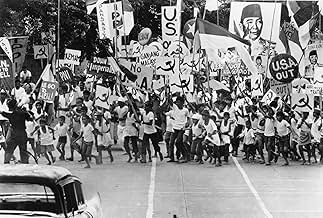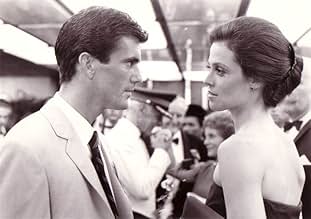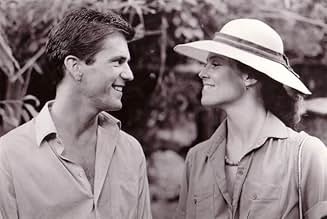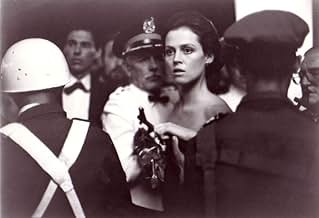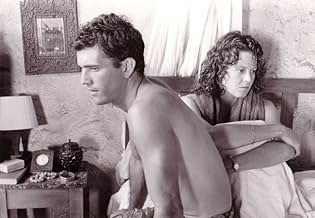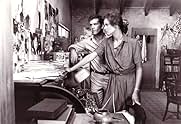AVALIAÇÃO DA IMDb
7,1/10
24 mil
SUA AVALIAÇÃO
Um jovem repórter australiano tenta navegar na turbulência política da Indonésia durante o governo do presidente Sukarno com a ajuda de um pequeno fotógrafo.Um jovem repórter australiano tenta navegar na turbulência política da Indonésia durante o governo do presidente Sukarno com a ajuda de um pequeno fotógrafo.Um jovem repórter australiano tenta navegar na turbulência política da Indonésia durante o governo do presidente Sukarno com a ajuda de um pequeno fotógrafo.
- Direção
- Roteiristas
- Artistas
- Ganhou 1 Oscar
- 10 vitórias e 14 indicações no total
Avaliações em destaque
I just caught TYOLD again on PBS, not having seen it for perhaps ten years. Wonder of wonders, compared to many other films of the early '80s, this one is just as riveting as it was when I first saw it and doesn't look like it has aged a minute. In addition I am picking up many nuances of the film that I had never seen before.
What I know, and knew, about the tribulations of Indonesia in the 1960's is contained in the reels of this film. The subject matter is so far outside of the typical Western/American perspective that it is amazing that the film got made. Gibson is very good as Guy Hamilton, and his performance is much more lean and energetic than what he has done since - he hadn't had years of Hollywood gloss and Lethal Weapon familiarity to file down his performances into the predictable boxes they have become. Sigourney Weaver is elegant, although her English accent is never really convincing and sometimes disappears altogether. Linda Hunt's portrayal of Billy Kwan is astonishing and won her a well-deserved Oscar in an incredible gender-switching performance that was inspired casting.
One thing I never noticed before was how Billy placed each of the three main characters in their perspective as the Indonesian puppets he explains to Guy. Arjuna, the hero who can be fickle and selfish (Guy). The princess he will fall in love with (Weaver's character). And the dwarf, who carries the wisdom for Arjuna (Billy Kwan).
I haven't much more to say about this film aside from how much I admire it and recommend it to anyone who hasn't seen it. Beautifully shot, well paced, with good performances and about an interesting and important subject matter, it is well worth your time.
What I know, and knew, about the tribulations of Indonesia in the 1960's is contained in the reels of this film. The subject matter is so far outside of the typical Western/American perspective that it is amazing that the film got made. Gibson is very good as Guy Hamilton, and his performance is much more lean and energetic than what he has done since - he hadn't had years of Hollywood gloss and Lethal Weapon familiarity to file down his performances into the predictable boxes they have become. Sigourney Weaver is elegant, although her English accent is never really convincing and sometimes disappears altogether. Linda Hunt's portrayal of Billy Kwan is astonishing and won her a well-deserved Oscar in an incredible gender-switching performance that was inspired casting.
One thing I never noticed before was how Billy placed each of the three main characters in their perspective as the Indonesian puppets he explains to Guy. Arjuna, the hero who can be fickle and selfish (Guy). The princess he will fall in love with (Weaver's character). And the dwarf, who carries the wisdom for Arjuna (Billy Kwan).
I haven't much more to say about this film aside from how much I admire it and recommend it to anyone who hasn't seen it. Beautifully shot, well paced, with good performances and about an interesting and important subject matter, it is well worth your time.
It's 1965 Jakarta in Indonesia under the brutal rule of President Sukarno. Guy Hamilton (Mel Gibson) is on his first foreign assignment for the Australian Broadcasting Service. He is befriended by photographer half-Chinese dwarf Billy Kwan (Linda Hunt). There is an air of anti-western feeling. Guy is lost without connections until Billy starts helping him out. He has an affair with British diplomat Jill Bryant (Sigourney Weaver). It's a world of murky Cold War politics, secrets and trying morality.
This has a great exotic atmosphere. The movie has a sense of impending doom. Mel Gibson is terrific and shows his superior star power. Linda Hunt creates such a compelling character. It does need to heighten the tension a little. The plot meanders in this murky world. It needs a direction. Nevertheless I just love the dark exotic mood.
This has a great exotic atmosphere. The movie has a sense of impending doom. Mel Gibson is terrific and shows his superior star power. Linda Hunt creates such a compelling character. It does need to heighten the tension a little. The plot meanders in this murky world. It needs a direction. Nevertheless I just love the dark exotic mood.
One of the most perfect movies ever made. A true slice of life - what art is supposed to be all about. The music is extraordinary - note how Jarre uses it (and I will say no more for fear of spoiling the effect). No, this wasn't filmed on location, but I don't think that should matter, as the ability of the film to evoke a place and a period is remarkable. I first saw this movie by chance; I have owned it ever since. It's one of these rare movies that are made as an artist is climbing upwards in career but not yet devoured by the commercial interests who will notice and try to effect a lucrative transformation.
This excellent movie is set in 1965 Indonesia, when an Australian reporter named Gay Hamilton is assigned on his first work as a foreign journalist. His apparently simple mission to Yakarta soon turns hot when he interviews a rebel leader , while President Sukarno was toppling by pressure left from communists and right from military. Guy soon is the hottest reporter with the help of his photographer, a native, half- Chinese midget named Kwan . Eventually Hamilton must confront moral conflicts and the relationship between Billy and him reaches some problems connected with a British diplomatic attaché , at the same time the political upheaval takes place in coup détat.
Mel Gibson is good as correspondent covering a conflict and finding himself becoming personally involved when he befriends a free-lance photographer named Billy Kwan and falling for a beautiful Embassy assistant, a mesmerizing Sigourney Weaver .The movie has its touching moments found primarily in the superb supporting performances as Michael Murphy as lively journalist , Bill Kerr as veteran Colonel and of course diminutive Linda Hunt who steals the show as sensible photographer in her Academy Award-winning character, a woman acting a man, and well deservedly prized. Moving and intimate musical score though composed by synthesizer by Maurice Jarre. Atmospheric cinematography that adequate as a mood-piece by Russell Boyd.
The motion picture is stunningly directed by Australian director Peter Weir who achieved several hits (Witness, Gallipoli, The last wave) and some flop (Mosquito coast, The plumber). The movie belongs to sub-genre that abounded in the 80s about reporters around the world covering dangerous political conflicts , such as Nicaragua in ¨Under fire¨ by Robert Spottswoode with Nick Nolte , Gene Hackman and Joanna Cassidy, Salvador in ¨Salvador¨ by Oliver Stone with James Woods and James Belushi, and Libano in ¨Deadline¨ by Nathaliel Gutman with Christopher Walken and Hywel Bennett. These movies are very much in the vein of ¨The year of living dangerously¨.
Mel Gibson is good as correspondent covering a conflict and finding himself becoming personally involved when he befriends a free-lance photographer named Billy Kwan and falling for a beautiful Embassy assistant, a mesmerizing Sigourney Weaver .The movie has its touching moments found primarily in the superb supporting performances as Michael Murphy as lively journalist , Bill Kerr as veteran Colonel and of course diminutive Linda Hunt who steals the show as sensible photographer in her Academy Award-winning character, a woman acting a man, and well deservedly prized. Moving and intimate musical score though composed by synthesizer by Maurice Jarre. Atmospheric cinematography that adequate as a mood-piece by Russell Boyd.
The motion picture is stunningly directed by Australian director Peter Weir who achieved several hits (Witness, Gallipoli, The last wave) and some flop (Mosquito coast, The plumber). The movie belongs to sub-genre that abounded in the 80s about reporters around the world covering dangerous political conflicts , such as Nicaragua in ¨Under fire¨ by Robert Spottswoode with Nick Nolte , Gene Hackman and Joanna Cassidy, Salvador in ¨Salvador¨ by Oliver Stone with James Woods and James Belushi, and Libano in ¨Deadline¨ by Nathaliel Gutman with Christopher Walken and Hywel Bennett. These movies are very much in the vein of ¨The year of living dangerously¨.
Peter Weir's movie, set in Sukarno's Indonesia in 1965, can be seen as four films in one. The first is socio-political, focusing on the plight of the impoverished Indonesian people, the impending insurrection by the communist movement, and the bloody, chaotic aftermath of the coup. The second, coloured in Graham Greene-ish tones, has a cast of western journalists and diplomats failing to make sense of what's happening around them, and falling back on sex, drink and cynicism. The third - and most important in commercial-cinema terms - is a convincingly acted romance between rookie foreign correspondent Guy Hamilton (Mel Gibson) and British diplomat Jill Bryant (Sigourney Weaver), culminating in an unlikely and sentimental ending to the film.
But it is the fourth of these "sub-movies" which is the most intriguing; this concerns the diminutive and enigmatic Australian/Chinese photographer Billy Kwan, an astonishing - and Oscar winning - portrayal by actress Linda Hunt. Billy sees himself as a puppet-master, pulling the strings of friends and colleagues, particularly of Jill and Guy, whom he throws together. But his need to take control also motivates him to help local people, not through indirect and political means, but directly like an early Christian, and this apparently benign course leads to tragedy. Billy is the true heart and conscience of this film.
Weir is not entirely successful in weaving these strands together, and leaves a few gaps in both plot and characterisation. He is also occasionally guilty of melodrama (a fault which, in the movie, Jill warns Guy about), especially in the film's closing scenes - though certainly not where he shows communist sympathisers being shot, which is factual. On the whole, however, the movie works on both commercial and artistic levels, and should be seen.
But it is the fourth of these "sub-movies" which is the most intriguing; this concerns the diminutive and enigmatic Australian/Chinese photographer Billy Kwan, an astonishing - and Oscar winning - portrayal by actress Linda Hunt. Billy sees himself as a puppet-master, pulling the strings of friends and colleagues, particularly of Jill and Guy, whom he throws together. But his need to take control also motivates him to help local people, not through indirect and political means, but directly like an early Christian, and this apparently benign course leads to tragedy. Billy is the true heart and conscience of this film.
Weir is not entirely successful in weaving these strands together, and leaves a few gaps in both plot and characterisation. He is also occasionally guilty of melodrama (a fault which, in the movie, Jill warns Guy about), especially in the film's closing scenes - though certainly not where he shows communist sympathisers being shot, which is factual. On the whole, however, the movie works on both commercial and artistic levels, and should be seen.
Você sabia?
- CuriosidadesDirector Peter Weir cast Linda Hunt in the role of Billy Kwan after failing to find an actor who could play the part the way he wanted.
- Erros de gravaçãoBilly's still camera is a Nikon F2 Photomic, which was not released until 1971, while the film takes place in 1965.
- Citações
Billy Kwan: What then must we do? We must give with love to whoever God has placed in our path.
- ConexõesFeatured in Peter Weir Industry Seminar 1989 (1989)
- Trilhas sonorasBeim Schlafengehen
from "Four Last Songs"
by Richard Strauss
Performed by Kiri Te Kanawa and London Symphony Orchestra
Conducted by Andrew Davis
Courtesy of CBS Masterworks
Published by Boosey-Hawkes
Principais escolhas
Faça login para avaliar e ver a lista de recomendações personalizadas
- How long is The Year of Living Dangerously?Fornecido pela Alexa
Detalhes
- Data de lançamento
- Países de origem
- Idiomas
- Também conhecido como
- O Ano em que Vivemos em Perigo
- Locações de filme
- Empresas de produção
- Consulte mais créditos da empresa na IMDbPro
Bilheteria
- Orçamento
- US$ 13.000.000 (estimativa)
- Faturamento bruto nos EUA e Canadá
- US$ 10.278.575
- Fim de semana de estreia nos EUA e Canadá
- US$ 35.000
- 23 de jan. de 1983
- Faturamento bruto mundial
- US$ 10.278.575
Contribua para esta página
Sugerir uma alteração ou adicionar conteúdo ausente

